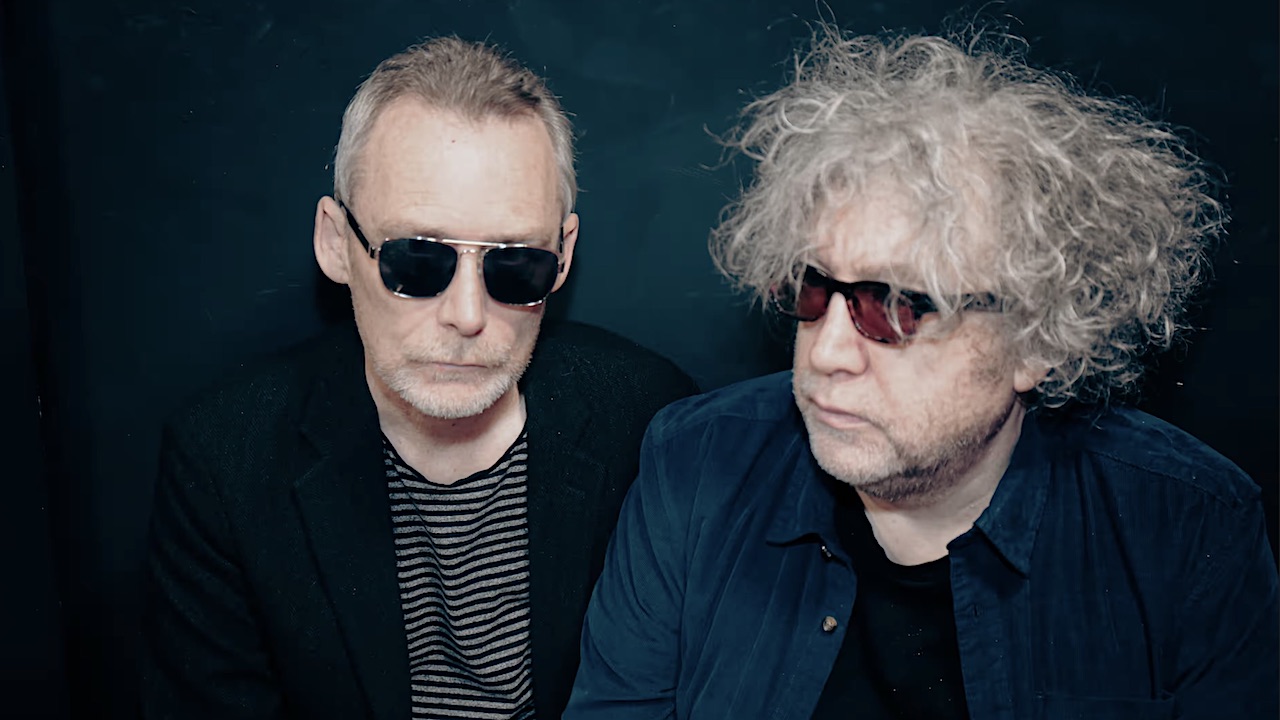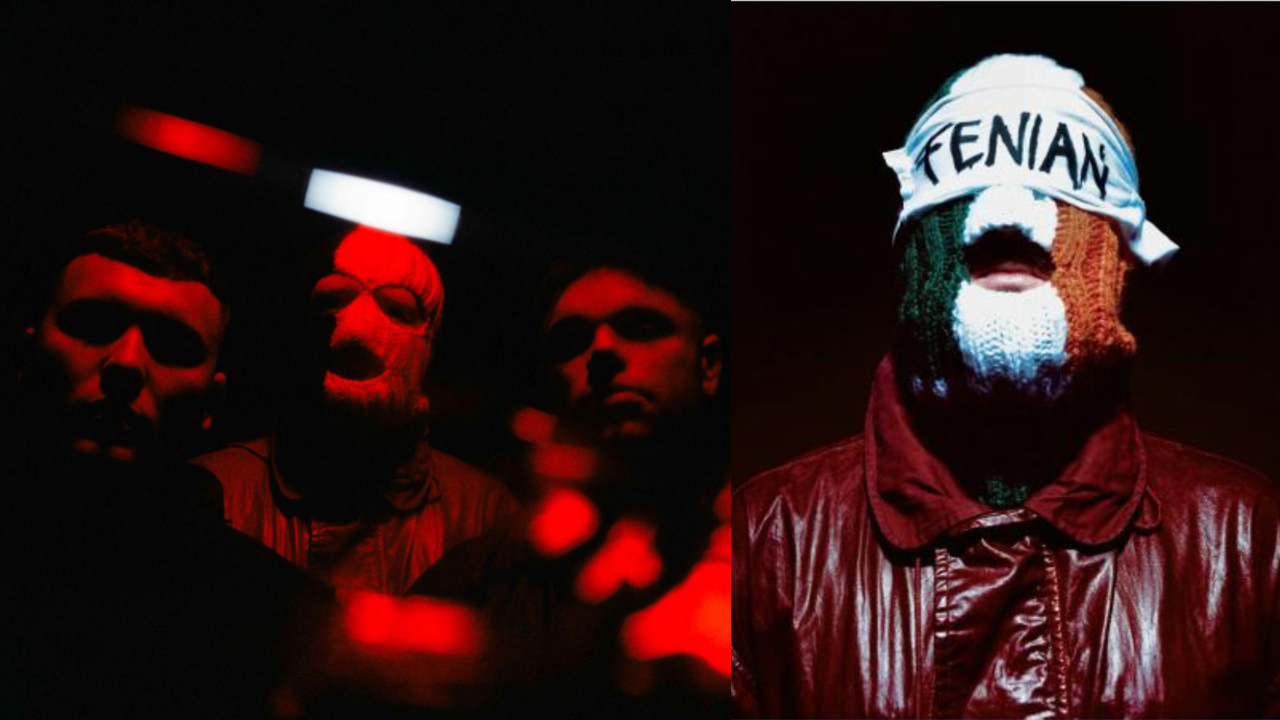“We’re still making records because we think we’re the best band in the world”: The Jesus and Mary Chain may not have destroyed the music industry as they had hoped, but they gave it a damn good shot
God bless The Jesus and Mary Chain

Every morning before entering Mogwai’s Castle Of Doom studio in Glasgow to work on the new Jesus And Mary Chain album, Jim Reid would head out on two-hour walk around the city. A meandering amble is one of the singer’s favourite things to do when his band are on tour, aimlessly wandering around a new town, taking in the sights, getting lost. It was the same but different in Glasgow, a location Reid knows inside out having grown up eight miles away in East Kilbride, where Jim and his brother William formed the Jesus And Mary Chain in 1983.
On some occasions Reid would look around and not know where he was. Other times, if he’d fallen off the wagon, he’d settle into a local boozer for a liquid breakfast. When he was sober, he'd find himself spending time at the Kelvingrove Art Gallery, a place he hadn’t been to since the '80s. All around him was memories, the shards of four decades of one of rock ’n’ roll’s most potent and visceral forces.
Reid isn’t sure if being back on home turf had an effect on the new record by The Jesus And Mary Chain but mulling it over down the phone from his home in Devon, he concedes that maybe it did. For starters, it’s called Glasgow Eyes.
“My immediate reaction would be that it could’ve been recorded anywhere but maybe that walk makes the difference,” he says. “Maybe it makes you feel a little bit more in a Glasgow frame of mind. It probably does seep in in ways that I don’t realise.”
Similarly, Reid says, him and William tried not to think about the fact the band’s 40th anniversary was approaching as they made their eighth album but that also must have worked its way in. Those four decades have taken in turmoil, chaos and vicious rows between the brothers but The Jesus And Mary Chain are still standing. There is a sense of celebration at the heart of Glasgow Eyes, not the sort of celebration that would ever raise a smile - this is The Jesus And Mary Chain, after all - but more a feeling of ebullient defiance that they’re still doing it.
“I’m proud of the fact we’ve been here for 40 years but, making a record, it should have nothing to do with it,” reckons Reid. “To us, it’s just another Mary Chain record but that in itself is something to celebrate.”
As Reid well knows, there was a time when the idea of “just another Mary Chain record” was a very unlikely scenario.
The band had emerged in the '80s with a sound that melded Phil Spector-ish 60s pop with squalling feedback and chainsaw guitars, a tug-of-war between soothing melodicism and barbed sonics that was perfectly captured on their game-changing 1985 debut Psychocandy. It was a pioneering form of rock music that would become a springboard for shoegazing and experimental noise-pop, inspiring a wave of bands to mix hooks with ear-shredding effects. Their sound was built on tension until the tension got too much – by the time of 1998’s sixth album Munki, the Reid brothers couldn’t bear to be in the studio together and recorded their parts separately. They split up later that year: more on that later.
They patched things up and reunited in 2007, though, with a seventh studio album, Damage And Joy, following in 2017. Glasgow Eyes, which homes in on their love of Suicide and Can and brings out the more electronic and synth-y side of their sound, shows they have lost none of their devotion to the cause. Reid says they are still doing it for the right reasons.
“We’re still making records because we think we’re the best band in the world,” he declares. “Now, loads of people may disagree with that but that’s the way we are going into this thing – we’re better than anybody else, we believe that whole-heartedly and I think it comes across in the music. Whether you agree with that statement or not, I think you can hear that we at least believe it.”
The Reid brothers possessed that self-belief from the very beginning. The reason they started the band in the first place, Reid recalls, was because they thought music in the 80s was so bad they were compelled to fix it.
To us, the music coming out of the radio in the 1980s was diseased
Jim Reid
“The 80s was particularly hateful,” he states. “We used to always have the conversation where it would be like, ‘Fuck , we’re so unlucky that this is our decade, we could’ve got the '60s or the fucking '70s but what do we get, the fucking '80s!’ We were so disgusted with it that we thought, ‘Let’s change it, the 80s doesn’t have to be all bad, let’s go and make a little corner of it pretty good’. To us, the music coming out of the radio was diseased and we wanted to inject penicillin into that radio and cure the disease.”
When he looks back at their career, Reid thinks The Jesus And Mary Chain did make a difference but fell short of their world-conquering aims.
“We actually did think we were going to completely change the music scene,” he says. “We had massive ambition and we thought we were going to completely destroy all of what needed tearing down. In the end, we did cause a bit of a shake-up but we were hopelessly naïve about the scale of the problem.”
The latest news, features and interviews direct to your inbox, from the global home of alternative music.
We said horrible things to each other and it left festering wounds for years
Jim Reid
Whilst the new album is powered with a sense of forward-thinking urgency, there is some looking back. Propulsive lead single Jamcod revisits one of the most harrowing nights in the band’s history - when the two brothers ended up in a fight so bad after a 1998 show at Los Angeles venue the House Of Blues that it brought an end to the first incarnation of the group.
“That night has been raked over so many times and everyone always wants to know about it,” states Reid, “but I’ve talked about it so much that I just thought I should write it down, try and get it across in a way that simple language doesn’t, how it actually felt at that time. It was a terribly traumatic experience, it wasn’t just one night, it was over a period of two or three nights, a prolonged explosion and the boom was at the House Of Blues, that’s when the actual gunpowder went off. It was horrible but memorable all at the same time.”
After the band split up, Reid says he thought of nothing other than that fateful night for months to come.
“I tried to make sense of it and make sense of what happened,” he recounts. “I don’t know if I really have done but maybe I started to at least realise that the band didn’t need to break up then. I also started to realise that at the time I thought it was all his fault but when I reviewed a lot of the arguments and occurrences, I started to realise that I was a complete arse as well, so I think we each gave as good as we got… or as bad as we got.”
Not only has Reid never seen another band who argued with such feistiness as he and his brother did, he’s never witnessed another set of humans go at it so ferociously.
“Seriously, we used to argue and we could clear a room,” he laughs. “There would be a room of two dozen people who would all have to leave because it was so uncomfortable the way that we used to scream at each other. People would be like, ‘Oh god, I don’t know if I should be witnessing this’. That was the way it was.”
These days, he says, both he and his brother have learned that there’s a line that shouldn’t be crossed.
“We argue now and we scream at each other but we know that the things that you say that are unsayable should stay unsaid, and they didn’t stay unsaid back then. We said horrible things to each other and it left festering wounds for years afterwards. The wounds have healed so why open up new ones?”
Instead, they have a legacy to celebrate. As well as the new record, there will also be an autobiography released this year. You only have to look at the breadth of artists who’ve covered their songs to see how influential they are – Pixies, Sandi Shaw, Fontaines D.C., Richard Hawley and, um, David Hasselhoff have all had a crack at reworking tracks from their catalogue.
“Hasselhoff was quite funny, I thought that was amusing,” Reid says. “We had a bit of chuckle. It's good when people do covers, it shows we’re getting through to people.”
They might not have changed the world quite in the way that they set out to but they remain an exhilarating band still pushing things forward. They wanted to remedy music’s ills but it’s no quick fix. The Jesus And Mary Chain’s intoxicating shake-up continues.
Glasgow Eyes by The Jesus And Mary Chain is out now on Fuzz Club. The band are currently on tour in the UK, and will launch their European tour on April 2 in Copenhagen, Denmark.
Niall Doherty is a writer and editor whose work can be found in Classic Rock, The Guardian, Music Week, FourFourTwo, Champions Journal, on Apple Music and more. Formerly the Deputy Editor of Q magazine, he co-runs the music Substack letter The New Cue with fellow former Q colleague Ted Kessler. He is also Reviews Editor at Record Collector. Over the years, he's interviewed some of the world's biggest stars, including Elton John, Coldplay, Radiohead, Liam and Noel Gallagher, Florence + The Machine, Arctic Monkeys, Muse, Pearl Jam, Depeche Mode, Robert Plant and more.

